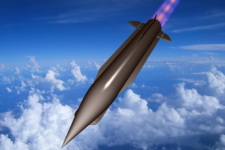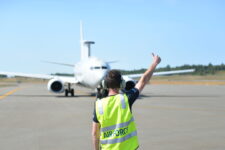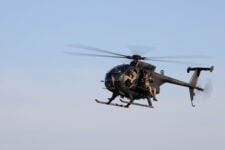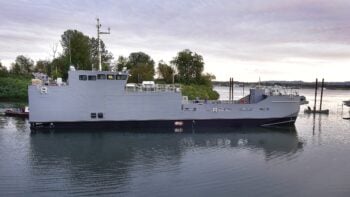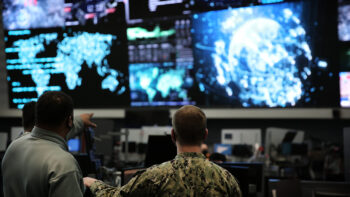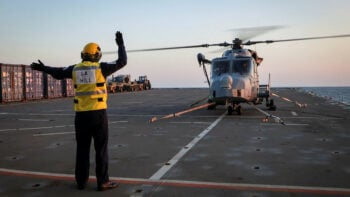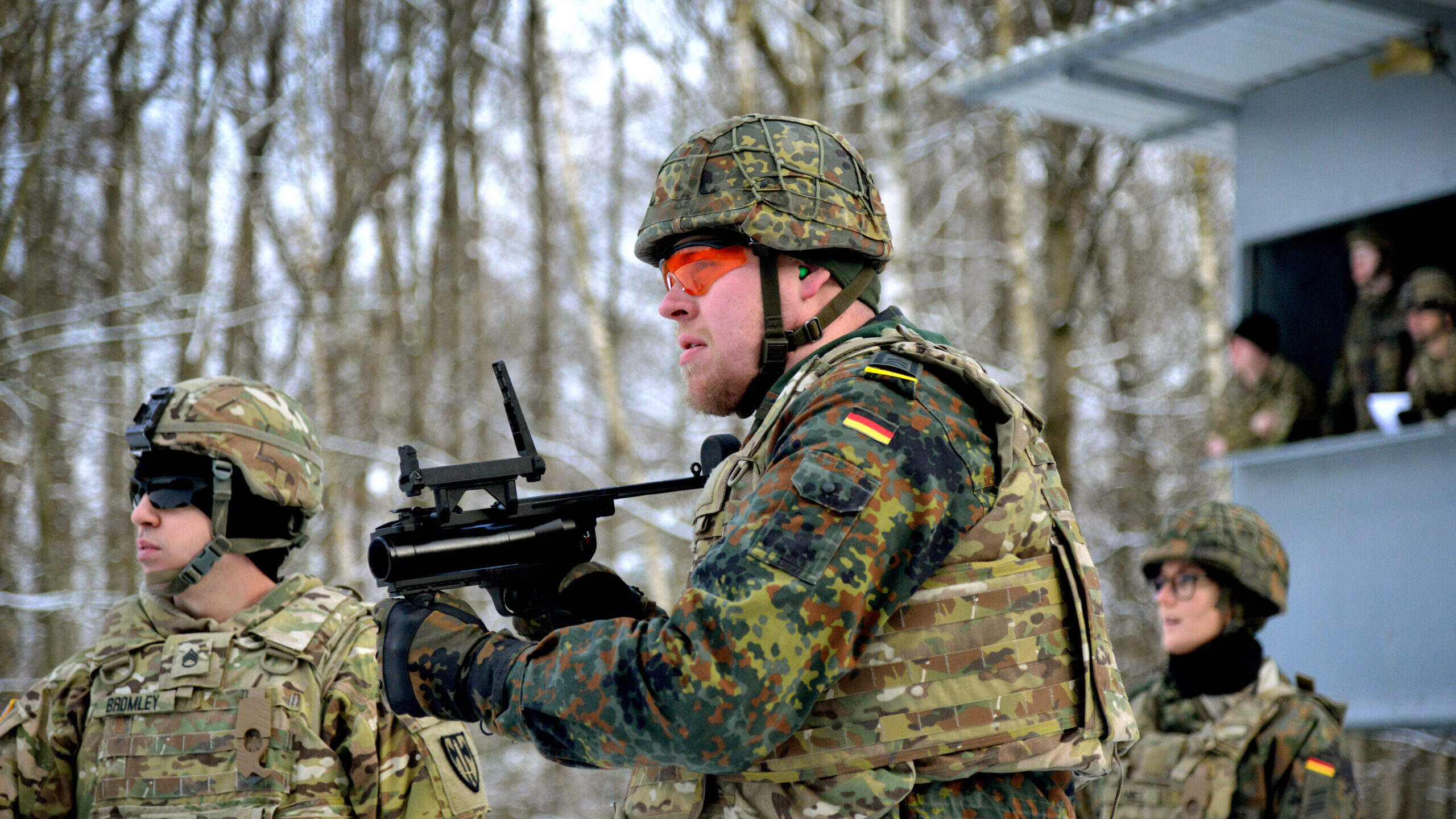
A German “Bundeswehr” Soldier fires the M320 Grenade Launcher during a weapon qualification range in partnership with Host Nation, Versorgungsbataillon 7 Bundeswehr, Boeblingen, Germany. (Yvonne Najera, Training Support Activity Europe)
PARIS — This week Germany published a document of historical import: the Nationale Sicherheitsstrategie, the nation’s first-ever national security strategy document.
It’s a strategy that emphasizes not only the technological evolution of the German military — whether regarding cybersecurity or space capabilities — but one premised on the idea that national security is not strictly about defense itself. It also means ensuring access to resources and energy; dealing with pandemics and disinformation; and, of course, climate change.
Annalena Baerbock, Germany’s foreign affairs minister, writes in her foreword that the strategy addresses “the three dimensions of security: protection from war and violence […], having the freedom to be able to shape our lives, our democracy, our economy the way we want [… and] protecting the natural resources on which all life depends.”
“Making us more robust in all areas of life is the aim of this our first National Security Strategy. After all, in the 21st century, security also means making sure our heating works in winter. Security means being able to find medication for our children in our pharmacies. Having smartphones that work because supplies of the necessary microchips are reliable. Getting to work safely because our trains are not paralyzed by cyberattacks,” she said.
It’s not all about “decision[s] on equipping the Bundeswehr, but also to the question as to the reliability of our supply chains or the freedom of our media landscape.”
When it does discuss the military, it says Germany plans to boost cyber and space capabilities, introduce deep precision strike weapons, strengthen its defense against espionage and sabotage, strengthen Europe’s defense technology base and harmonize European arms export controls. Unsurprisingly, no details are given as to how this will be achieved as the wide-ranging document is only 76 pages long.
Germany does underscore an “unshakeable” commitment to NATO and the EU, remarking that its “security is indivisible from that of our European partners and allies” and noting that it stands “resolutely by the mutual defense pledge under Article 5 of the North Atlantic Treaty.”
Berlin will strengthen the Bundeswehr and “will allocate two percent of our GDP, as an average over a multi-year period, to reaching NATO capability goals, initially in part via the newly created special fund for the Bundeswehr,” although this funding has not yet been secured.
Regarding Germany’s arms exports, “the federal Government will continue to adhere to its restrictive baseline policy,” taking into account the importing country’s line on “human rights, democracy and the rule of law.” But Germany will also weigh “our alliance and security interests, geostrategic challenges, support for partners facing direct threats, and the requirements of enhanced European arms cooperation.”
Competitors, Foes And Friends
The document is circumspect when it deals with another geopolitical frontier: China’s sphere of influence. The strategy refers to China as a “partner without whom many of the most pressing global challenges cannot be resolved.” But it also says the Asian country is a “competitor and systemic rival,” remarking that “the elements of rivalry and competition have increased in recent years.”
As China is a major trading partner for Germany, Ulrike Franke, a senior policy fellow at the European Council on Foreign Relations concludes in her Twitter thread that “the German government is trying to walk a very, very thin line between the US’ confrontational approach and a more cooperative – not just business-friendly, but also climate-change-cooperation – approach.” She remarks that “it’s difficult” and that “many won’t like it.”
The strategy is less ambivalent about Russia, which it says is “for now the most significant threat to peace and security in the Euro-Atlantic area.” Its “war of aggression” against Ukraine has “wrecked Europe’s peaceful order” and directly threatens “our security and that of our allies in NATO and the EU,” it says.
Even if “neither Germany nor NATO seek any rivalry or confrontation with Russia […] we are prepared and able at any time to defend our sovereignty and freedom and that of our allies.”
As for Germany’s friends, only two are mentioned by name: France and the US.
“We and our neighboring country France enjoy a close friendship […] to which we owe major steps in European integration, a process we view as indispensable. At the same time, we are firmly rooted in the transatlantic alliance, which expresses our close ties and partnership with the United States.”
The document notes that “we are aware of our joint responsibility [with France] to further the EU’s integrations and ability to act at international level,” adding that this friendship is “also expressed in terms of security policy in the mutual assistance commitment under Article 4 of the Treaty of Aachen and in our cooperation on major arms projects.”
Analysts Offer Mixed Reactions
So what is the document missing? Jörn Fleck, senior director of the Atlantic Council’s Europe Center, finds a lack “of institutional and process changes that would help the implementation of the Zeitenwende [turning-point].” He said in a brief published by the council that he thinks something like the American National Security Council should have been created, saying that “most long-term observers of Germany will agree this is urgently needed to effectively coordinate an inter-agency process across the federal government and with state authorities and international partners, but also to drive strategic culture more in the medium term.”
Fleck also noted there is no “clear follow-up process for implementation—always the biggest challenge with these strategies and who owns them—and installation of a regular review that forces future governments to keep up this process in regular intervals.”
Benjamin Tallis, a research fellow at the German Council on Foreign Relations (DGAP) finds the document “overall, disappointing […] but also has some interesting and positive points to work with.”
Tallis explained on Twitter that “there is not much that suggests how Germany will plug its very real capability and credibility gaps in security – and not much that would reassure allies in CEE (Central and Eastern Europe) that it will live up to its ‘special responsibility’ for the European pillar of NATO.”
Likewise Roderick Kefferpütz, director of the Heinrich-Böll-Stiftung European Union office in Brussels, suggested online that he was concerned that very little attention was given “to how geopolitical frontier areas, such as the Arctic, Antarctic, deep sea, and space might affect the security environment and international order.”
TAI exec claims 20 Turkish KAAN fighters to be delivered in 2028
Temel Kotil, TAI’s general manager, claimed that the domestically-produced Turkish jet will outperform the F-35 Joint Strike Fighter.


